- Home
- Annie Proulx
Fine Just the Way It Is Page 8
Fine Just the Way It Is Read online
Page 8
Time passed, and the sagebrush, nurtured and cosseted as neither piglet nor chicken nor few human infants had ever been—for Mizpah had taken to mixing gravy and meat juice with its water—grew tremendously. At twilight it now looked like a big man hoisting his hands into the air at the command to stick em up. It sparkled festively in winter snow. Travelers noted it as the biggest sagebrush in the lonely stretch of desert between Medicine Bow and Sandy Skull station. It became a landmark for deserting soldiers. Bill Fur, clutching the handle of a potato hoe, hit on the right name when he announced that he guessed he would go out and clear cactus away from the vicinity of their Sagebrush Kid.
About the time that Bill Fur planed a smooth path to and around the Sagebrush Kid, range horses became scarce in the vicinity of the station. The Furs and local ranchers had always been able to gather wild mustangs, and through a few sessions with steel bolts tied to their forelocks, well-planned beatings with a two-by-four and merciless first rides by some youthful buster whose spine hadn’t yet been compressed into a solid rod, the horses were deemed ready-broke to haul stagecoaches or carry riders. Now the mustangs seemed to have moved to some other range. Bill Fur blamed it on the drought which had been bad.
“Found a water hole somewheres else,” he said.
A party of emigrants camped overnight near the station, and at dawn the captain pounded on the Furs’ door demanding to know where their oxen were.
“Want a git started,” he said, a man almost invisible under a flop-rimmed hat, cracked spectacles, full beard and a mustache the size of a dead squirrel. His hand was deep in his coat pocket, a bad sign, thought Bill Fur who had seen a few coat-pocket corpses.
“I ain’t seen your oxes,” he said. “This here’s a horse-change station,” and he pointed to the corral where two dozen broomtails stood soaking up the early sun. “We don’t have no truck with oxes.”
“Them was fine spotted oxen, all six matched,” said the captain in a dangerous, low voice.
Bill Fur, curious now, walked with the bearded man to the place the oxen had been turned out the night before. Hoofprints showed where the animals had ranged around eating the sparse bunchgrass. They cast wide and far but could not pick up the oxen trail as the powdery dust changed to bare rock that took no tracks. Later that week the disgruntled emigrant party was forced to buy a mixed lot of oxen from the sutler at Fort Halleck, a businessman who made a practice of buying up worn-out stock for a song, nursing them back to health and then selling them for an opera to those in need.
“Indans probly got your beasts,” said the sutler. “They’ll bresh out the tracks with a sage branch so’s you’d never know but that they growed wings and flapped south.”
The telegraph operator at the station made a point of keeping the Sabbath. After his dinner of sage grouse with rose-haw jelly, he strolled out for an afternoon constitutional and never returned to his key. This was serious, and by Wednesday Bill Fur had had to ride into Rawlins and ask for a replacement for “the bible-thumpin, damn old goggle-eyed snappin turtle who run off.” The replacement, plucked from a Front Street saloon, was a tough drunk who lit his morning fires with pages from the former operator’s bible and ate one pronghorn a week, scorching the meat in a never-washed skillet.
“Leave me have them bones,” said Mizpah, who had taken to burying meat scraps and gnawed ribs in the soil near the Sagebrush Kid.
“Help yourself,” he said, scraping gristle and hocks onto the newspaper that served as his tablecloth and rolling it up. “Goin a make soup stock, eh?”
Two soldiers from Fort Halleck dined with the Furs and at nightfall slept out in the sagebrush. In the morning their empty bedrolls, partly drifted with fine sand, lay flat, the men’s saddles at the heads for pillows, their horse tack looped on the sage. The soldiers themselves were gone, apparently deserters who had taken leave bareback. The wind had erased all signs of their passage. Mizpah Fur made use of the bedrolls, converting them into stylish quilts by appliquéing a pleasing pattern of black stripes and yellow circles onto the coarse fabric.
It may have been a trick of the light or the poor quality window glass, as wavery and distorting as tears, but Mizpah, sloshing her dishrag over the plates and gazing out, thought she saw the sagebrush’s arms not raised up but akimbo, as though holding a water divining rod. Worried that some rambunctious buck trying his antlers had broken the branches, she stepped to the door to get a clear look. The arms were upright again and tossing in the wind.
Dr. Frill of Rawlins, on a solitary hunting trip, paused long enough to share a glass of bourbon and the latest town news with Mr. Fur. A week later a group of the doctor’s scowling friends rode out inquiring of the medico’s whereabouts. Word was getting around that the Sandy Skull station was not the best place to spend the night, and suspicion was gathering around Bill and Mizpah Fur. It would not be the first time a stationmaster had taken advantage of a remote posting. The Furs were watched for signs of opulence. Nothing of Dr. Frill was ever found, although a hat, stuck in the mud of a playa three miles east, might have been his.
A small group of Sioux, including R. Singh, on their way to the Fort Halleck sutler’s store to swap hides for tobacco, hung around for an hour one late afternoon asking for coffee and bread which Mizpah supplied. In the early evening as the dusk thickened they resumed their journey. Only Singh made it to the fort, but the shaken Calcutta native could summon neither Sioux nor American nor his native tongue to his lips. He bought two twists of tobacco and through the fluid expression of sign language tagged a spot with a Mormon freight group headed for Salt Lake City.
A dozen outlaws rode past Sandy Skull station on their way to Powder Springs for a big gang hooraw to feature a turkey pull, fried turkey and pies of various flavors as well as the usual floozy contingent and uncountable bottles of Young Possum and other liquids pleasing to men who rode hard and fast on dusty trails. They amused themselves with target practice on the big sagebrush, trying to shoot off its waving arms. Five of them never got past Sandy Skull station. When the Furs, who had been away for the day visiting the Clug ranch, came home they saw the Sagebrush Kid maimed, only one arm, but that still bravely raised as though hailing them. The telegraph operator came out of his shack and said that the outlaws had done the deed and that he had chosen not to confront them, but to bide his time and get revenge later, for he too had developed a proprietorial interest in the Sagebrush Kid. Around that time he put in a request for a transfer to Denver or San Francisco.
Everything changed when the Union Pacific Railroad pushed through, killing off the stagecoach business. Most of the stage station structures disappeared, carted away bodily by ranchers needing outbuildings. Bill and Mizpah Fur were forced to abandon the Sandy Skull station. After tearful farewells to the Sagebrush Kid they moved to Montana, adopted orphan cowboys and ran a boardinghouse.
The decades passed and the Sagebrush Kid continued to grow, though slowly. The old stage road filled in with drift sand and greasewood. A generation later a section of the coast-to-coast Lincoln Highway rolled past. An occasional motorist, mistaking the Sagebrush Kid for a distant shade tree, sometimes approached, swinging a picnic basket. Eventually an interstate highway swallowed the old road and truckers used the towering Sagebrush Kid in the distance as a marker to tell them they were halfway across the state. Although its foliage remained luxuriant and its size enormous, the Kid seemed to stop growing during the interstate era.
Mineral booms and busts surged through Wyoming without affecting the extraordinary shrub in its remote location of difficult access until BelAmerCan Energy, a multinational methane extraction company, found promising indications of gas in the area, applied for and got permits and began drilling. The promise was realized. They were above a vast deposit of coal gas. Workers from out of state rushed to the bonanza. A pipeline had to go in and more workers came. The housing shortage forced men to sleep four to a bed in shifts at the dingy motels forty miles north.
To ease the ho
using difficulties, the company built a man-camp out in the sagebrush. The entrance road ran close to the Sagebrush Kid. Despite the Kid’s size, because it was just a sagebrush, it went unnoticed. There were millions of sagebrush plants—some large, some small. Beside it was a convenient pullout. The man-camp was a large gaunt building that seemed to erupt from the sand. The cubicles and communal shower rooms, stairs, the beds, the few doors were metal. A spartan kitchen staffed by Mrs. Quirt, the elderly wife of a retired rancher, specialized in bacon, fried eggs, boiled potatoes, store-bought bread and jam and occasionally a stewed chicken. The boss believed the dreary sagebrush steppe and the monotonous diet were responsible for wholesale worker desertion. The head office let him hire a new cook, an ex-driller with a meth habit whose cuisine revolved around canned beans and pickles.
After three weeks Mrs. Quirt was reinstated, presented with a cookbook and a request to try something new. It was a disastrous order. She lit on complex recipes for boeuf bourguignonne, parsnip gnocchi, bananas stuffed with shallots, kale meatballs with veal ice cream. When the necessary ingredients were lacking she did what she had always done on the ranch—substituted what was on hand, as bacon, jam, eggs. After a strange repast featuring canned clams, strawberry Jell-O and stale bread, many men went outside to heave it up in the sage. Not all of them came back and it was generally believed they had hiked forty miles to the hot-bed motel town.
The head office, seeing production, income and profits slump because they could not keep workers on, hired a cook who had worked for an Italian restaurant. The food improved dramatically, but there was still an exodus. The cook ordered exotic ingredients that were delivered by a huge Speedy Food truck. After the driver delivered the cases of sauce and mushrooms, he parked in the shade of the big sagebrush to eat his noontime bologna sandwich, read a chapter of Ambush on the Pecos Trail and take a short nap. Three drillers coming in from the day shift noticed the truck idling in the shade. They noticed it again the next morning on the way to the rig. A refrigerator truck, it was still running. A call came three days later from the company asking if their driver had been there. The news that the truck was still in the sagebrush brought state troopers. After noticing spots of blood on the seat and signs of a struggle (a dusty boot print on the inside of the windshield), they began stringing crime-scene tape around the truck and the sagebrush.
“Kellogg, get done with the tape and get out here,” called a sergeant to the laggard trooper behind the sagebrush. The thick branches and foliage hid him from view and the tape trailed limply on the ground. Kellogg did not answer. The sergeant walked around to the back of the sagebrush. There was no one there.
“Goddamn it, Kellogg, quit horsin around.” He ran to the front of the truck, bent and looked beneath it. He straightened, shaded his eyes and squinted into the shimmering heat. The other two troopers, Bridle and Gloat, stood slack-jawed near their patrol car.
“You see where Kellogg went?”
“Maybe back up to the man-camp? Make a phone call or whatever?”
But Kellogg was not at the man-camp, had not been there.
“Where the hell did he go? Kellogg!!!”
Again they all searched the area around the truck, working out farther into the sage, then back toward the truck again. Once more Bridle checked beneath the truck, and this time he saw something lying against the back inner tire. He pulled it out.
“Sergeant Sparkler, I found this.” He held out a tiny scrap of torn fabric that perfectly matched his own brown uniform. “I didn’t see it before because it’s the same color as the dirt.” Something brushed the back of his neck and he jumped, slapping it away.
“Damn big sagebrush,” he said, looking at it. Deep in the branches he saw a tiny gleam and the letters “OGG.”
“Jim, his nameplate’s in there!” Sparkler and Gloat came in close, peering into the shadowy interior of the gnarled sagebrush giant. Sergeant Sparkler reached for the metal name tag.
The botanist sprayed insect repellent on his ears, neck and hair. The little black mosquitoes fountained up as he walked toward the tall sagebrush in the distance. It looked as large as a tree and towered over the ocean of lesser sage. Beyond it the abandoned man-camp shimmered in the heat, its window frames warped and crooked. His heart rate increased. Years before he had scoffed at the efforts of botanical explorers searching for the tallest coast redwood, or the tallest tree in the New Guinea jungle, but at the same time he began looking at sagebrush with the idea of privately tagging the tallest. He had measured some huge specimens of basin big sagebrush near the Killpecker dunes and recorded their heights in the same kind of little black notebook used by Ernest Hemingway and Bruce Chatwin. The tallest reached seven feet six inches. The monster before him certainly beat that by at least a foot.
As he came closer he saw that the ground around it was clear of other plants. He had only a six-foot folding rule in his backpack, and as he held it up against the huge plant it extended less than half its height. He marked the six-foot level with his eye. He had to move in close to get the next measurement.
“I’m guessing thirteen feet,” he said to the folding rule, placing one hand on a muscular and strangely warm branch.
The Sagebrush Kid stands out there still. There are no gas pads, no compression stations near it. No road leads to it. Birds do not sit on its branches. The man-camp, like the old stage station, has disappeared. At sunset the great sagebrush holds its arms up against the red sky. Anyone looking in the right direction can see it.
The Great Divide
1920
The black secondhand Essex rattled and throbbed along the frozen dirt road. The sky drooped over the undulating prairie like unrolled bolts of dirty wool, and even inside the car they could smell the coming snow. There was no heater, and Helen, a young woman with walnut-colored hair, was wrapped from her shoulders down in an old-fashioned buffalo robe, the fur worn to the hide in places. At a small cairn of stones her husband, Hi Alcorn, turned left onto a faint track.
“Close now,” he said. “Maybe two miles.”
“If that storm don’t beat us there,” she answered in her breathy voice.
“We’re okay,” he said. “We’re A-okay. Headin for our own place. Year from now drivin up we’ll be able to see the lighted windows.”
Hi’s feet worked the pedals, and she saw that the laces of his old worn oxfords were knotted with bits of string. An impasto of yellow mud which had ossified to stucco and then rubbed back into dust on the Essex’s floorboards discolored the shoes.
“I don’t see any houses,” she said. “It’s not like what we heard from Mr. Bewley. He said it would be almost a town by now.”
“Not yet. I guess this next year we will all build. The ones of us that come late.”
There were two sides to the colony, the east side already settled, the west side, where they had bought a homestead, still unformed.
Hi coughed a little from the dust and went on. “Mr. and Mrs. Wash, like us just startin out, and two brothers, Ned and Charlie Volin. They’ll be buildin. The Washes was at the picnic.” Abruptly he jerked the wheels to the right where a wooden stake, its top painted white, leaned. Fence posts without wire lined toward the west.
“Was Mrs. Wash the one with the strawberry mark on her chin?”
“I guess that was her. I remember something was wrong about her face. Okay, this’s it. Southeast corner. We’re on our place. Recognize it?”
They had gone out in May, right after their wedding, looking at homestead sites with Mr. Antip Bewley. They bought the land and had returned in the late summer, at Mr. Bewley’s invitation, for the Great Divide picnic. By then they were living in a boardinghouse in Craig. Helen made a few dollars a week helping Mrs. Ruffs change the sheets and cook for the boarders. Mrs. Ruffs was a widow who had carried on her husband’s freighting business after he died, but found the care of six horses and their heavy harness too much for her. She sold the business, team and wagons, bought a sizable house in Cr
aig and hung out her sign—RUFFS BED & BOARD. Helen hated the job as all the furniture and the spaces behind the wallpaper were infested with bedbugs. They had a peculiar smell, like old beef fat. Hi, of course, had been out to the property many times, measuring, deciding where the house and barn should go, marking his corners and setting fence posts. One man could set posts well enough, but it took two or three to string the wire.
She would not forget the first sight of Mr. Antip Bewley, huge, towering above Hi. His hands were the size of hay forks. His head, hair and skin the color of raw wood, was shaped as though someone had taken a rectangular chunk of twelve-by-twelve and sanded off the corners, leaving a smooth jawline without disguising the blockiness of the shape. The face was indented by two furrowed cheek dimples. But it was when Bewley smiled that the landscape lit up as though a crackle of lightning had traversed it, for his four front teeth, top and bottom, were solid gold, pure as wedding rings.
“Call me Ant,” he had said, pumping Hi’s hand, then bending over Helen’s rough farm-girl paw as though to kiss it or the air above it, in courtly but ironic mockery. They all rode in Mr. Bewley’s touring car.
Hi, who subscribed to The Great Divide, already knew something about Bewley. He had been reading Bewley’s stories championing homestead settlements of public land in defiance of the big cattlemen—“range hogs,” he called them. On the way out to the platted sites, the big man talked enthusiastically about converting empty rangeland to happy homesteads that would give “the little people” a chance. Helen, sitting between the two men, was conscious of the body heat each gave off. She made up her mind to sit in the back on the return.

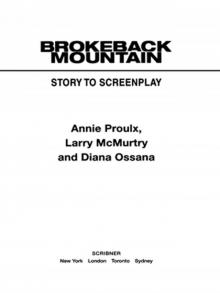 Brokeback Mountain
Brokeback Mountain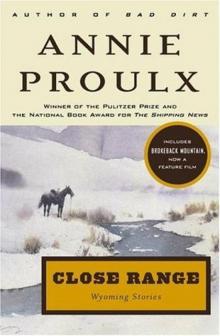 Close Range
Close Range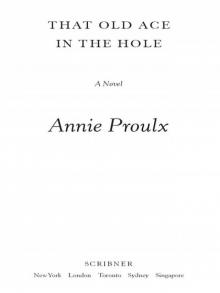 That Old Ace in the Hole
That Old Ace in the Hole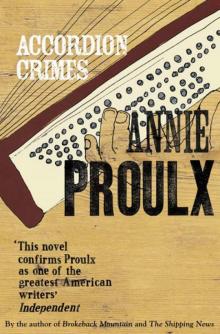 Accordion Crimes
Accordion Crimes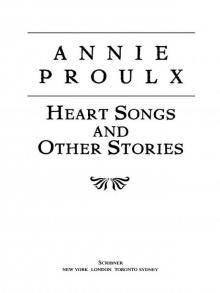 Heart Songs and Other Stories
Heart Songs and Other Stories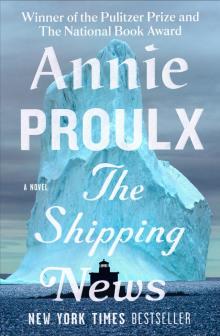 The Shipping News
The Shipping News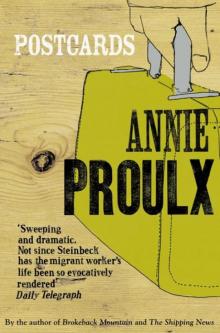 Postcards
Postcards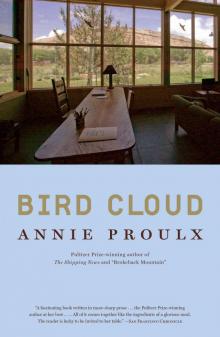 Bird Cloud
Bird Cloud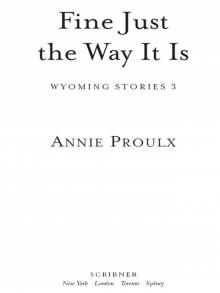 Fine Just the Way It Is
Fine Just the Way It Is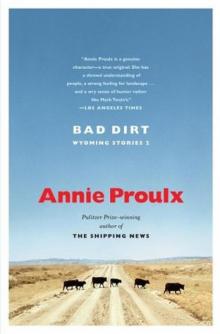 Bad Dirt
Bad Dirt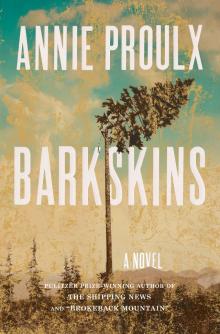 Barkskins
Barkskins BrokebackMountain
BrokebackMountain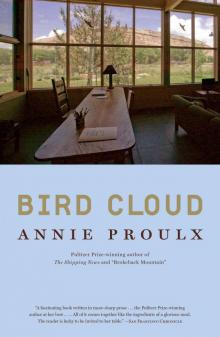 Bird Cloud: A Memoir of Place
Bird Cloud: A Memoir of Place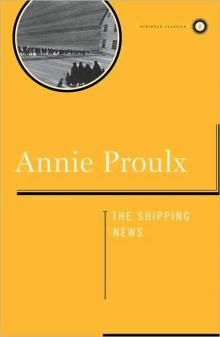 Shipping News_A Novel
Shipping News_A Novel